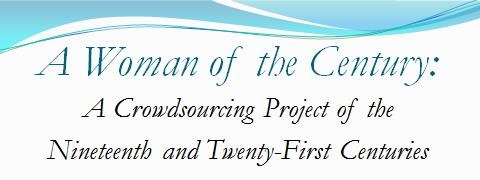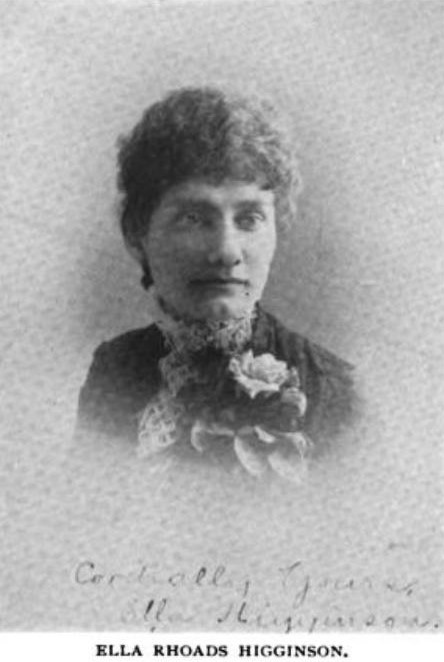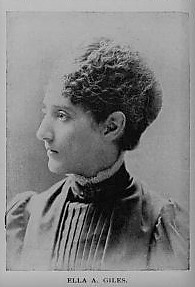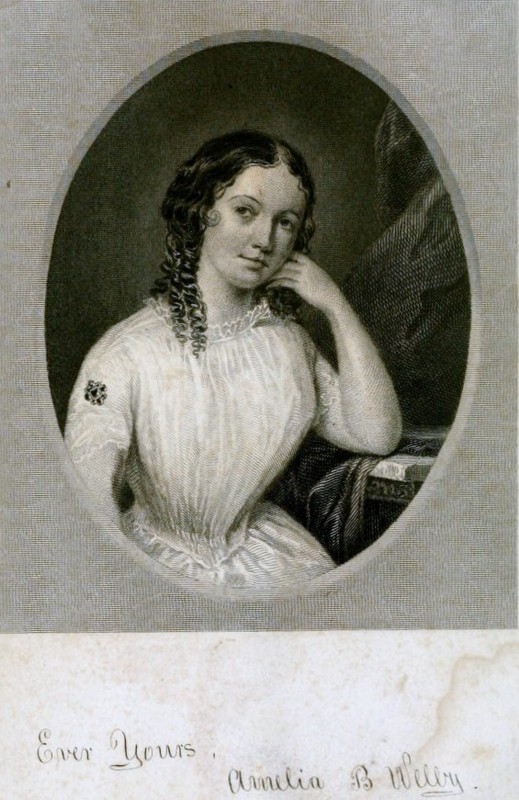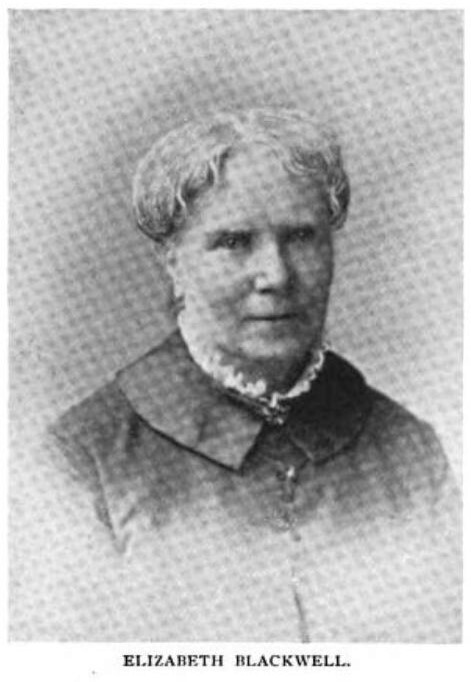January 28 - February 3
Women of the Week
Poet and author Ella Rhoads Higginson, who was born on January 28, 1862, author Ella A. Giles, who was born on February 2, 1851, author Amelia B. Coppuck Welby, who was born on February 3, 1819, and physician Elizabeth Blackwell, who was born on February 3, 1821, are this week's Women of the Week.
-
To learn about them by viewing their items, please click on their images.
-
To read their biographical sketches in A Woman of the Century, please click on the highlighted page numbers to the left of their images.
Poet and author Ella Rhoads Higginson was born in Council Grove, Kansas, on January 28, 1862. Her family moved to Portland, Oregon, when she was a child, and they later lived in Oregon City, Oregon.
Ella married Russell C. Higginson in 1886, and the couple moved to Bellingham, Washington. He was a druggist, and she began publishing her writing. Ella contributed to many magazines, including Harper's Magazine, McClure's Magazine, Once A Week, Scribner's Magazine, and Woman's Home Companion. She also was a book critic for The Seattle Times. Ella's most well-known poem was "Four Leaf Clover."
She served as editor of the women's department and contributed poems to West Shore. In 1905, Ella served as assistant editor of The Westerner, a new Seattle, Washington periodical that was edited by Edgar L. Hampton. According to The Ranch of June 15, 1905, "The feature in this number is 'Orilla," a Puget Sound novelette by Ella Higginson."
Ella was well-regarded by her contemporaries. The Seattle Republican of April 5, 1912, noted, "In Bellingham there lives one of the truly great novelists, Ella Higginson. Her 'Mary Ella Out West,' if that is the correct title, is the equal of either the 'Scarlet Letter' or 'Adam Bede.'"
In addition to her writing, Ella, a women's rights supporter, was the campaign manager for Frances C. Axtell, the Washington State Legislature's first female member.
Ella's philanthropic work included being involved with founding Bellingham's first public library and volunteering for the American Red Cross.
On June 17, 1931, Ella received the honor of becoming the poet laureate of Washington State.
She passed away on December 27, 1940.
Ella was featured in "Ella Higginson and the Pacific Northwest" by Laura Laffrado on C-Span's BookTV video on December 9, 2013.
Ella A. Giles was born near Madison, Wisconsin, on February 2, 1851. Growing up in the home of a father who was a philanthropist and a mother who fostered Ella’s love of art and literature, she pursued interests in those areas throughout her life. As her A Woman of the Century profile notes, “She early showed musical talent. Her fine voice was carefully cultivated by Hans Balatka. She was quite distinguished as an oratorio and church singer when her health failed and she was compelled to abandon what promised to be a successful career in music.” (320)
Although her dream was not to be, the resilient Ella was determined to make her mark. Turning to literary pursuits, she wrote Bachelor Ben, her first novel, which was published in 1875 by Madison publishers Atwood & Culver and Chicago publishers Janson, McClurg & Co. It was reviewed by numerous periodicals, including Literary World (August 1, 1875) and Saturday Review (September 25, 1875) and sold one thousand volumes in just sixty days. (Los Angeles Herald) The next year, she published Out from the Shadows, which was reviewed by The Independent on June 15, 1876, and by several other periodicals. In 1879, Ella's newest book, Maiden Rachel, appeared on the shelves of bookstores and libraries. Like her earlier work, it was reviewed by The Independent (August 7, 1879), Literary World (July 5, 1879), and other periodicals. Madison readers would have had an opportunity to meet the author, as Ella became a librarian at the Madison Public Library that year. She remained at the library for five years while giving public talks, writing, and publicizing other writers. On May 21, 1882, Ella penned “The West’s Literature” for a Wisconsin newspaper, promoting the growing literature of her section of the country.
In 1884, while caring for her father, Ella wrote poetry and social science articles. She published Flowers of the Spirit, a volume of her poetry, in 1891. As one of the leaders of the Contemporary Club, she also hosted literary gatherings on topics such as Browning, Emerson, and political economy. (“Unitarian Church Became Established Here in 1869” - Los Angeles Herald ) As “Old Days on West Wilson Street,” a 1922 Capital Times article, recalled, "One of the most attractive of the literary salons of Wisconsin was modestly but most delightfully held at Miss Giles’ [sic] home during her life in Madison. Her friend, Miss Zona Gale, was often a sharer in the pleasures of the gatherings, and a member of the home circle for several winters while a student at the university.” Ella also fought for women’s rights as a member of The Association for the Advancement of Women. (Los Angeles Herald)
Although she lived in Wisconsin, Ella traveled frequently. One of those trips was to Yellowstone National Park with the Wisconsin Press Association. Stella A. Gaines Fifield, a Wisconsin journalist who is in A Woman of the Century, and her husband were in the same Pullman sleeper car as Ella during this Northern Pacific Railroad excursion. Ella spent winters in warmer climates.
After her father passed away in May of 1895, Ella decided to make Los Angeles her home. The Los Angeles Herald celebrated Ella’s entrance into the city with a lengthy laudatory article on September 29th. It concluded with praise from the newspaper and a friend: “Miss Giles possesses the rare quality of magnetism and unconsciously draws people about her. As a friend said of her, she has no sullen brow, no sarcastic smile and no bitter word for a sister’s success; but her cheerful ‘she deserves it all’ is as ready as her warm hand.”
Ella married journalist George Drake Ruddy in 1896. While in Los Angeles, she expanded her social network, getting to know author Hattie Tyng Griswold, Caroline Severance, and numerous others.
By 1902, Ella and George were living at Mission Cottage on Wilshire Boulevard in Los Angeles. She was President of the California Badger Club of Los Angeles and wrote Club Etiquette: A Conversation between a Club Woman and a Non-member Who Answer the Calling Question over the Tea-Cups.
During the Summer of 1904, Ella traveled from California to Short Beach, Connecticut to visit Ella Wheeler Wilcox, her long-time friend and fellow poet, at her spectacular warm-weather home. While on the way, Ella stopped in Boston to visit the homes of Longfellow and Lowell, as well as in Concord to see where Emerson, Hawthorne, and the Alcotts had lived. The two Wisconsin natives collaborated on a book, Around the Year, which was published that year. The next year, Ella wrote the "Description of Mrs. Wilcox's Home and Life" for her friend's autobiography, The Story of A Literary Career. She continued to write poetry, publishing Lace O' Me Life in 1916.
Ella passed away in Los Angeles on June 26, 1917. She is buried in Madison’s Forest Hill Cemetery.
Amelia B. Coppuck Welby was born in St. Michael's, Maryland, on February 3, 1819. Best known by her pseudonym "Amelia," she was an author who spent most of her life in Louisville, Kentucky.
Amelia's first contributions were to The Louisville Journal. The Southern Literary Messenger published Amelia's poem "Musings" in its April 1841 issue and her "The Presence of God" in its issue for December of that year.
Poems by Amelia was published by Abel Tompkins of Boston in 1845, and her book received a positive review in The Southern Quarterly Review. As Amelia's A Woman of the Century profile notes, "It was republished in 1850, in New York, in enlarged form, with illustrations by Robert W. Weir" (757). Amelia also contributed to Graham's Magazine in 1852.
She passed away in Louisville on May 3, 1852.
Elizabeth Blackwell, who was born in Bristol, England, on February 3, 1821, became one of the first women physicians in the United States. She persisted in applying to various medical schools as her applications were rejected because she was a woman. Geneva College accepted her application though the administration thought it was a "joke" that a woman applied in 1847.
She advocated for herself to be treated as an equal to her male colleagues when participating in the Reproductive Anatomy class, which made the male students uncomfortable. Furthermore, by her attentive and thorough note-taking skills, Miss Blackwell proved she was able to understand the information being presented in her courses.
During her Spring and Summer breaks from medical school, Elizabeth observed how the poorest of the poor and the insane were treated at the Blockney Almshouse in Philadelphia, Pennsylvania. Unfortunately, the male physicians wanted nothing to do with her because she was a woman.
Miss Blackwell wrote her thesis, "Ship Fever," (Typhus) based upon the Irish Immigrants who were severely ill on the ships coming from Ireland to America. It was published in the Buffalo Medical Journal in February 1849, and Miss Blackwell graduated with her medical degree a few months later.
Elizabeth developed the first hospital dedicated to women, The New York Infirmary for Indigent Women and Children, in 1853. This endeavor was supported by donations and successful fundraising, after Elizabeth was denied the opportunity to rent office space for her medical practice due to her gender. Her sister, Emily Blackwell, the third woman physician in the United States, worked alongside Elizabeth. They were accompanied in their work by female medical students and two female nurses.
In 1855, she adopted a seven year old girl, Katherine, known as "Kitty," from the Randall's Island Orphanage. Elizabeth felt that her "little orphan" Kitty lifted her spirits after she had felt lonely and isolated living in New York. Kitty was also Elizabeth's secretary as she conducted the detailed correspondence with her mother that became part of the Elizabeth Blackwell Papers.
Miss Blackwell's dream to open a Women's Medical College of the New York Infirmary became a reality in 1868, as the New York State Legislature granted her a charter to do so. Miss Blackwell believed firmly that it was one thing to open a poor college with charity, but more important to open a great college for women medical students that would provide professional skills, hospital practice, and the introduction of hygiene. At the college, female medical students engaged in a progressive succession of studies, the first of its kind for medical training for women.
Miss Blackwell retired from her medical practice. She spent the rest of her later years in Hastings, England, as a consultant and advocate for women in medicine.
Elizabeth died on May 31, 1910.
